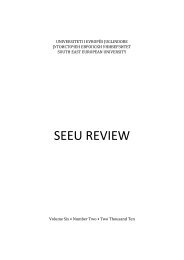SEEU Review vol. 5 Nr. 2 (pdf) - South East European University
SEEU Review vol. 5 Nr. 2 (pdf) - South East European University
SEEU Review vol. 5 Nr. 2 (pdf) - South East European University
Create successful ePaper yourself
Turn your PDF publications into a flip-book with our unique Google optimized e-Paper software.
Eneida Sema (LL.M)<br />
An appeal can filed against the decision of the Inspector General within<br />
30 days from the date of receiving the notice before the Court of First<br />
Instance in the district where the infringement has occurred. The decision of<br />
Inspector General which has become final constitutes an executive title. In<br />
case these decisions are not <strong>vol</strong>untarily executed, the Bailiff’s office<br />
executes them by sequestering a part of the infringer’s property in the value<br />
of the fine. This sequestration is temporary and lasts 6 months. If the<br />
deadline expires and the decision has not been yet executed, the confiscation<br />
of property is made in the value of the fine.<br />
Article 202/5 of the Code of Labor, amended by law no. 9125 dated July<br />
29, 2003, provides that any infringement is punishable by a fine. When the<br />
infringement is repeated, or at the expense of some employees, the overall<br />
amount of fines determined, will be no greater than the fivefold of the<br />
maximum fine.<br />
One of the main obligations for the employer is to respect the form of the<br />
contract of employment. Failure to implement the provisions of the Labor<br />
Code in relation to the form of the contract concluded affects the validity of<br />
the contract and is reflected in the responsibility of the employer, under<br />
Article 202 / 2 of this Code.<br />
When the infringement is committed by a person assigned by the<br />
employer to represent the company, the responsibility for paying the fine in<br />
this case is solitary.<br />
If infringements of the provisions of this Code constitute a criminal<br />
offence, provisions of the Criminal Code are accordingly applied. Article<br />
289 of this Code on the violation of rules at work, provides that death or<br />
serious injury of person’s health caused as a result of violation of rules<br />
related to work, production and service as established by law, Council of<br />
Ministers Decisions and the regulations for technical security and discipline,<br />
protection at work, hygiene, protection from fire, by persons assigned to<br />
respect these rules and undertake measures to implement them, is punishable<br />
by fine or imprisonment of up to ten years. When death or serious injury of<br />
the health of some employees is caused as a result of the criminal offence<br />
committed, then the sentence regarding the person responsible, is not less<br />
than five years.<br />
The Criminal Code also provides for other criminal offences concerning<br />
the responsibility of the employer in some particular cases. Article 201 of<br />
this Code provides for air pollution from the emitted smokes, gases and other<br />
toxic and radioactive materials beyond the limits of the permissible norms.<br />
102

















